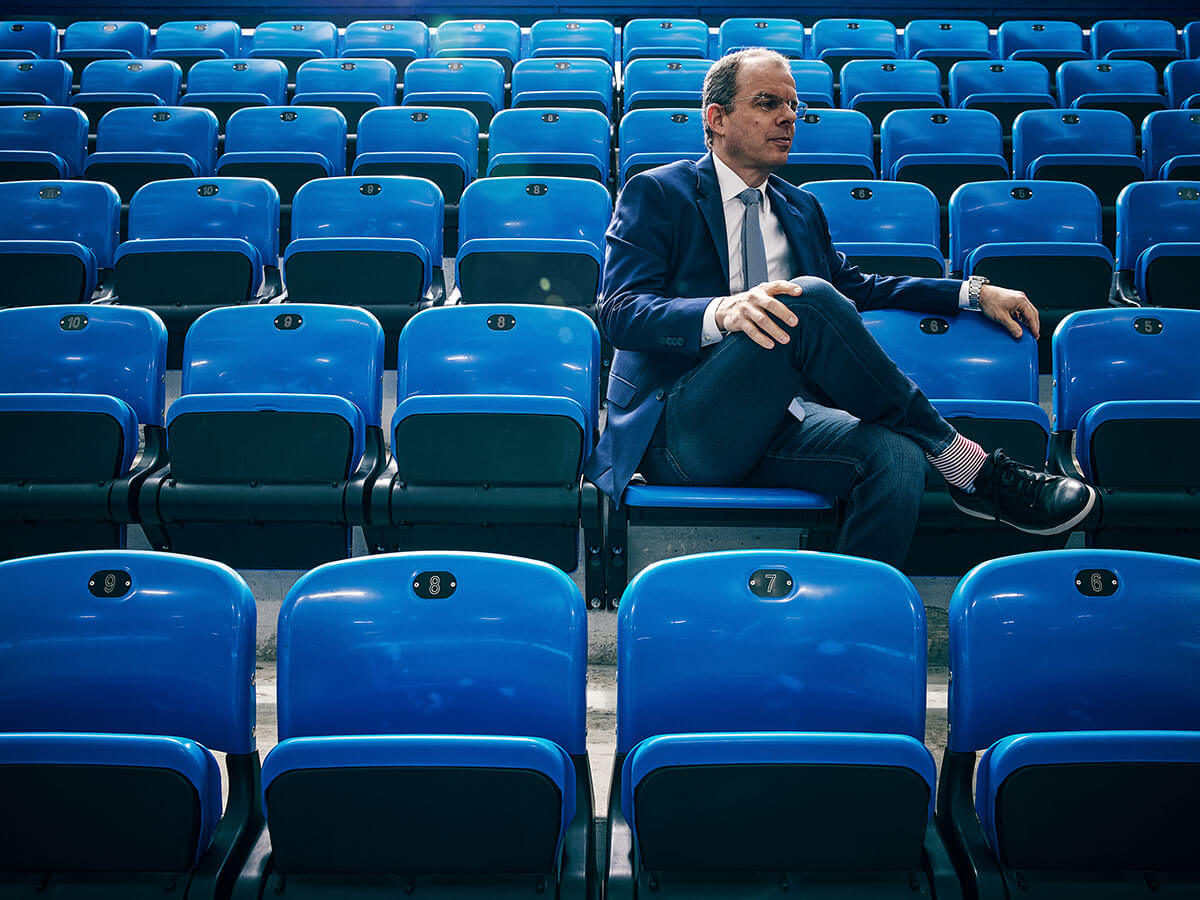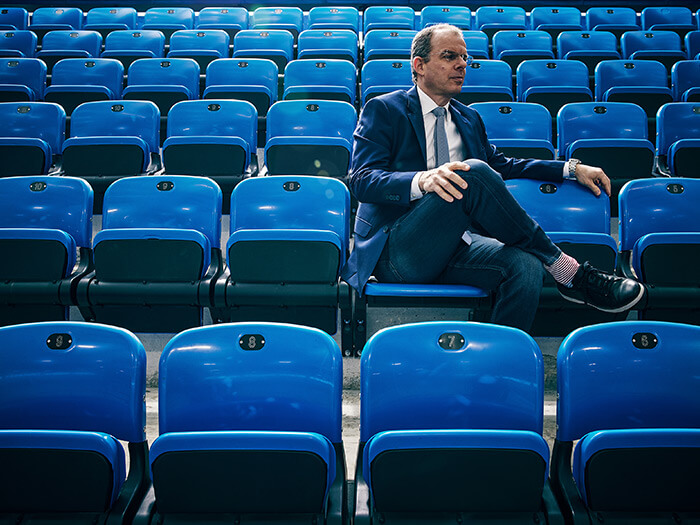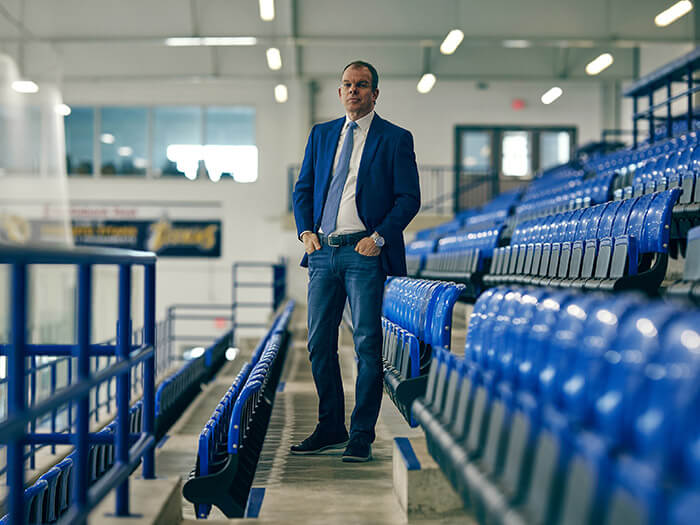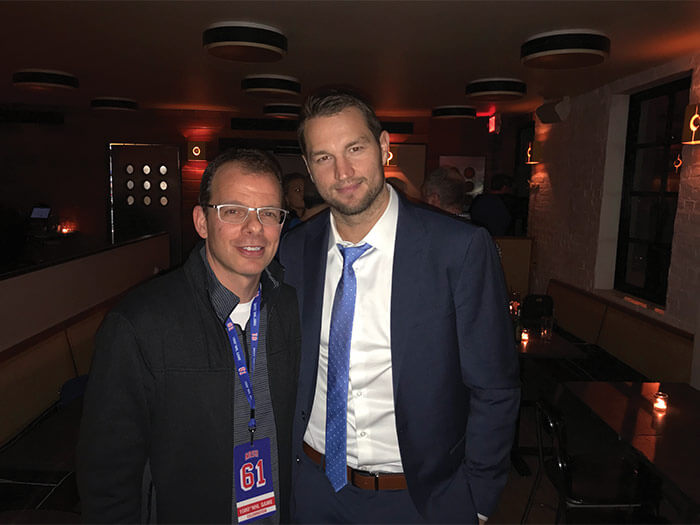
From accountant to NHL player agent: The story of Joe Resnick
 Joe Resnick was born and raised in Toronto and grew up an avid NHL fan (Photograph by Daniel Ehrenworth)
Joe Resnick was born and raised in Toronto and grew up an avid NHL fan (Photograph by Daniel Ehrenworth)
Flip through Joe Resnick’s daily planner and two things immediately become clear.
First, the man is meticulously organized.
“So if you look here . . .” he opens the book and a kaleidoscope of colours pop off the page. Dates are highlighted in green, names are blue, lists of cities and small towns across Ontario are underscored in yellow. He writes down the names of everyone he spoke to that day and what was discussed. Notes and numbers fill the page, a labyrinth of dates and details that resemble blueprints at first glance.
Second, Resnick is constantly in motion. According to the page he holds up to his Zoom camera—pulled at random from a week last January—he travelled to Aurora, Mississauga, Peterborough, Oshawa and St. Catharines. The following week is even busier.
Resnick, 54, has spent his life around the game of hockey, the last 27 years professionally. He is an anomaly in his field: a high-powered sports agent with an accounting background.
The planner is a dead giveaway, Resnick says. “I’m old-school. This is all CPA stuff,” he says of his record-keeping, one of the many ways his accounting designation shapes how he goes about his work.
An agent is the main point of contact for their client. A good one serves as the ultimate problem-solver, as well as a fair but ruthless negotiator. For some clients, Resnick has negotiated contracts worth tens of millions. For others, he’s had to break the news that no team wants them. When he’s not on the phone—a rarity—he’s scouting games and recruiting players. All told, he’s spent thousands of hours in minor league hockey arenas (and even more in his car), along with countless meetings with prospects and their parents, tasked with deciding whether or not they can entrust their child’s future to Resnick.
Resnick’s improbable journey has taken him from the bullpen of a major accounting firm to co-founding his own company, Top Shelf Sports Management. The walls of his home office in midtown Toronto, lined with framed photos of Resnick and his clients, are a testament to his success; Top Shelf currently represents nearly 60 National Hockey League (NHL) players and junior prospects, including Joe Thornton, Logan Couture, and rising stars Akil Thomas and Ryan O’Rourke.
The odds of building a startup that successfully competes with monolithic talent agencies like Newport and Creative Artists Agency (CAA) is akin to winning the lottery (in other words, you’d have a better chance of getting struck by lightning twice in the same year). But luck has only played a small part in Resnick’s story. His CPA experience gives him a unique edge over other agents, but his resourcefulness, entrepreneurial spirit and willingness to risk it all got him to where he is today.
Trace Resnick’s career path and you’ll find a step-by-step guide on how to chase your dreams—and a warning of just how hard it can be to make them come true.
 Resnick’s gruelling schedule had him working as a consultant by day and scouting games across Ontario at night (Photograph by Daniel Ehrenworth)
Resnick’s gruelling schedule had him working as a consultant by day and scouting games across Ontario at night (Photograph by Daniel Ehrenworth)
Joe Resnick’s parents used to tell him that he had hockey in his DNA. Born and raised in Toronto, he grew up an avid NHL fan and closely followed the amateur draft—an annual event in which NHL teams select players from the junior ranks in the hopes that they will turn into stars. Each year, he’d send for the league’s draft guide in the mail, studying its pages like a CFE exam prep textbook.
If Resnick wasn’t at his house or at the rink, he was at the home of one of his closest friends, Brian Wilks. Wilks was a standout hockey player who played for the Kitchener Rangers of the Ontario Hockey League (OHL) and was eventually drafted in the second round of the NHL draft. Every Friday night, Resnick would go with Wilks’s parents to cheer him on. After a game in Kitchener, Resnick noticed Wilks in conversation with an older gentleman. He seemed impressive. Important.
“Who was that?” he asked Brian.
“That’s my agent,” Wilks said.
Resnick knew agents existed but like a tourist in the Everglades spotting alligators for the first time, he’d never seen one in person. He raced home and began researching every aspect of an agent’s role—and what it takes to become one.
In 1985, Resnick became the first member of his family to attend university, enrolling in the University of Toronto’s commerce program, which he figured was a good feeder system to the accounting program. He had always been good with numbers and genuinely interested by the work the profession does, so the transition seemed natural. So, too, did his move to a top firm upon graduation in 1990.
Resnick’s first accounting job was at the downtown Toronto offices of Coopers & Lybrand. In his second year he was moved to the company’s Owner-Managed Services (OMS) group, which focused on small businesses. There, he had the opportunity to meet with entrepreneurs on a daily basis. He paid close attention to how his clients got their businesses off the ground, constantly asking about their journey and lessons learned along the way.
Resnick was moving up the corporate ladder, “but my true passion was hockey.” Yet, it was apparent that the long hours required of him at C&L made it impossible to put in the time needed to scout and recruit players. “If I was going to be in hockey, I needed to find a job that was going to give me that ability.” After four years at C&L, he sought work at a smaller accounting firm or as an in-house accountant who worked a strict nine-to-five.
He accepted a position as a financial consultant with Omnilogic, a software startup founded by four former SAP employees, which would later be sold to IBM. Resnick met with the group and was transparent about his goals of ultimately becoming a hockey agent. The founders liked both his openness and ambition.
After meeting with Omnilogic, he returned to the C&L offices and met with one of the partners. “Can I shut the door?” Resnick asked before explaining his decision to work for Omnilogic.
“Do they have an office?” the partner asked.
“No,” Joe replied.
“What are they paying you?”
“Less than what you’re paying me.”
“No office and less money? I wish you the best of luck.”
It’s October 26, 2017, an hour or so after the New York Rangers defeated the visiting Arizona Coyotes in an early-season matchup at Madison Square Garden. For Rangers forward Rick Nash, the game marked number 1,000 in his career—making him one of roughly 350 players to reach the milestone in the NHL’s century-long history. To celebrate, Resnick has rented out a Manhattan restaurant, with Nash’s friends and family in attendance, and had badges made reading “Rick Nash: 1,000 games.”
Nash, 36, was one of Resnick’s earliest clients, and certainly his most accomplished. A three-time Olympian (two-time gold medallist) and six-time NHL all-star, Nash was a highly coveted prospect coming out of the junior ranks in Brampton, Ont. When he was 14 years old—already destined for stardom—Nash’s parents arranged meetings with a handful of agents, Resnick included. He and Nash attended a Mississauga IceDogs game and discussed Nash’s future. There’s a natural ease and openness to Resnick that Nash picked up on quickly. “An agent is somebody you need in all situations,” says Nash, “whether it’s trouble at home or trouble on the ice. With Joe it just felt like we could communicate easily and be comfortable telling each other anything.”
“The personalized service I got with Joe was top-notch,” adds Nash, who retired in 2019. “I don’t think I ever had to wait more than two hours for Joe to get back to me.”
In 2002, Nash was selected first overall in the NHL draft by the Columbus Blue Jackets and signed what was then the largest rookie contract in league history: three years at US$1.2 million per season.
When Nash’s entry-level deal was set to expire in 2005, Resnick and Blue Jackets general manager Doug MacLean began negotiating terms on a new deal. The team first offered $12 million over three years, the standard for young stars at the time. Resnick balked. MacLean risked losing Nash to the open market and desperately wanted to retain his best player. Resnick wanted to maximize his client’s value.
“Would you consider something longer-term?” MacLean asked.
Resnick explained that only if MacLean were to give Nash a premium for signing a long-term contract would his client consider it. Eventually both sides settled on a five-year, US$27-million contract. The deal set a precedent and established a new standard; future stars like Corey Perry, Ryan Getzlaf and Phil Kessel would all sign similar extensions.
Although Nash’s next contract would be even larger—eight years at US$62.4 million—Resnick is still most proud of the $27-million post-rookie deal. “That contract was a stepping stone for me. It gave me legitimacy, like, ‘This guy knows what he’s doing.’ ”
 Rick Nash’s 1,000th played game, 2017 (Photograph by Jared Silber)
Rick Nash’s 1,000th played game, 2017 (Photograph by Jared Silber)
With C&L in the rearview, Resnick was ready to embark on his next chapter. But once he arrived for his first day as Omnilogic’s financial consultant, he was told there had been a change: In order to accommodate their chief client, Union Gas, 80 per cent of Resnick’s job would now take place three hours west of Toronto in Chatham, Ont.
Over the next year and a half he fell into a gruelling routine. On Monday he’d wake up at 5:30 a.m. and drive to Chatham to start the workweek. He’d stay in hotels and return to Toronto on Thursday or Friday.
For the next five years, his off hours were spent scouting junior games in search of a diamond in the rough—or any player willing to take him on. On Mondays he’d drive to London or Windsor. Tuesdays were in Petrolia or Sarnia. Wednesdays were usually spent in St. Thomas, and if he wasn’t Toronto-bound on Thursday, he would attend another game in Windsor. “It was hell,” he says. “I was tired.” And he had little to show for it.
“I was accomplishing a whole lot by learning, but I was making nothing. No money. But I was doing very well in consulting. It was a cash cow to support my floundering hockey business.”
When he left C&L in 1994, he had given himself five years to get the agency business off the ground. But now the clock had run down. “It’s not happening,” he thought.
The Stanley Cup has made the trip to Woodstock, Ont., only once, on a hot July day in 2014. Joe Resnick was there. His client, then-Los Angeles Kings defenceman Jake Muzzin, like all championship-winning players, got to spend the day with the iconic trophy and brought it to his hometown. The day-long celebration included a parade and autograph signing, along with a cookout attended by close friends and family. Ten years into representing Muzzin, Resnick felt like both.
He’d first made the trip to the Muzzin home in 2004 to pitch his services to Jake, an up-and-coming talent playing for the Brantford 99ers, a minor league club one level below the OHL. A few agents had reached out to the Muzzins over the phone, but Resnick was the only one who made the trip to meet in person, a gesture that impressed the family.
“He sold all of his accolades,” recalls Muzzin, now 31 and a member of the Toronto Maple Leafs. “But, for my family, it wasn’t about that. It was about having a guy you’re going to trust to look after you for this journey.
“He’ll fight tooth and nail for his guys. At the end of the day that’s all you could ask for.”
 Resnick and Jake Muzzin (Courtesy of Joe Resnick)
Resnick and Jake Muzzin (Courtesy of Joe Resnick)
Resnick’s five-year experiment may have been nearing its end, but he was finding it hard to walk away from the game. In late 1998, he ran into an old camp counsellor, Brad Robins, at a hockey tournament. “I’m starting a new agency,” Robins said. Great, Resnick thought, another guy thinking he’s going to get rich in the business.
But Robins had an ace up his sleeve: He was partnering with Gord Kirke.
The name carried considerable weight in the hockey business. Kirke, a successful lawyer who shifted to player management, was best known for representing mega-star prospect Eric Lindros in the early ’90s. When Resnick was first starting out, he had sent his resume to Kirke’s office and never heard back.
Now Kirke was joining Robins and Gord Stellick, a former general manager of the Toronto Maple Leafs, to form a new agency, KSR Sports Representatives Inc.
“I’d already put in so many hours and days and years,” Resnick recalls. “And yet, I was thinking, ‘Maybe this will be the start of my career.’ ” In January 1999, he was brought on board as director of junior hockey, all while maintaining his consulting career on the side.
At the 1999 OHL draft, none of the players Resnick recruited were selected in the first two rounds. It was an undisputed failure. “At that point I thought I was going to be a consultant for the rest of my life.”
The 2000 OHL draft, however, was a different story. Resnick’s new young recruit, Rick Nash, was one of the most coveted players available. At a bruising six-foot-four and with a knack for scoring goals, he was what scouts call a “can’t-miss” prospect. Nash was drafted fourth overall by the London Knights, one of three first-round picks Resnick represented. The next year, he had three more first-rounders. He was beginning to make a name for himself.
But recruiting players is as unglamorous as it gets. It can be a humbling and time-consuming grind. Even Gord Kirke was already growing tired of the business. Resnick recalls a particular recruiting visit alongside Kirke at a prospect’s home somewhere in small-town Ontario. “You’ve got Gord there, who’s a brilliant Queen’s Counsel lawyer. Meanwhile, the dog’s humping his leg and the family’s glued to the Leafs game on TV. At the end of the meeting, the father said, ‘We’re gonna think about it.’ ”
Resnick and Kirke stepped out into the cold night. “I’m done,” Kirke said.
Later that year, in 2004, KSR’s partners sold the company to major talent agency International Management Group (IMG). Resnick was part of the asset transfer. He went to work helping build IMG’s roster of clients and, after 10 long years, finally walked away from his consulting job for good.
There are two types of phone calls an agent has to make to his clients. The easy ones are why people like Resnick get into the business—like the call he made to client John Mitchell in the summer of 2012.
After playing for the Maple Leafs the previous season, Mitchell had been demoted to the minor leagues and eventually traded. He was now a free agent, meaning any team could sign him. But only one, the Colorado Avalanche, showed any interest.
Resnick and Mitchell were hoping to land a one-year deal for $875,000. Colorado offered $1.1 million. “It’s a two-year deal, right?” Resnick asked, pushing his luck. Sure enough, the team agreed.
He called his client. “Mitch, we’ve got a deal. Two years at $1.1 million.”
“Wait, so $550,000 a year, Joe?”
“No, Mitch. $2.2 million total.”
Mitchell broke down in tears. So did Resnick. “It wasn’t the biggest contract. But, for John Mitchell at that time, it was massive, and it couldn’t have happened to a nicer guy.”
Then there are the hard calls, like the one he had to make to ex-NHLer Peter Holland in 2017. “Pete, there’s just nothing there right now.” Or the even tougher call he had to make to his top client, Rick Nash, in 2019. Despite wanting to play for several more years, a series of concussions had forced the then-34-year-old to hang up his skates for good. “It was so emotional because there was nothing anybody could do. He just couldn’t play. It was devastating.”
“Joe was always going to be there for his clients,” Nash says, “for the good and the bad.”
 In 2012, Mitchell had been demoted and traded, but still managed to land a $2.2-million deal (Photograph by Michael Martin)
In 2012, Mitchell had been demoted and traded, but still managed to land a $2.2-million deal (Photograph by Michael Martin)
One morning in 2006, Resnick entered IMG’s office to find it nearly empty. The company, he learned, was selling off its sports properties to rival CAA. The football division was the first to go. Then baseball. Hockey wasn’t far behind.
One of Resnick’s fellow agents at IMG was John Thornton, older brother and agent of NHL star Joe Thornton. Over the years, John would send the occasional email to Resnick: “You take Nash, I’ll take my brother. We’ll create a dynasty.” Resnick had always dismissed the idea as a joke. Besides, Thornton wasn’t under contract with IMG like Resnick was. He could walk out the door whenever he pleased.
Now, on the verge of being a transferred asset once again, Thornton’s emails took on a new urgency for Resnick. If there’s a time to make a move, he thought, this is it. He told the company he wanted out of his contract. “That,” he says, “is when things got ugly.”
Resnick was given an ultimatum: Leave your players behind and you’re free to go. Or leave with your players and cut the firm a big cheque.
To surrender his clients would have been career suicide, so he embarked on a year-and-a-half-long legal process to leave the company—with his players—and start his own shop, Top Shelf, alongside John Thornton.
He constantly feared the deal would fall through. “[Going back] wasn’t an option. Once you say you want to go out on your own, you kind of create this imaginary line that gets crossed,” he says.
Resnick was orchestrating his very own Jerry Maguire moment, but he still had to convince his clients to leave the larger agency behind and go with him. His pitch was simple: “Nothing is going to change.” In the end, all but two of Resnick’s 25 clients stayed with him.
“I had all my trust in Joe,” says Rick Nash, who had already made the move with Resnick from KSR to IMG before settling at Top Shelf. “It made sense to me for Joe to have his own firm so he can reap the benefits from all of his players. I couldn’t have been more excited for him.”
Resnick eventually agreed on a settlement and paid lump sum payments (“high six-figures”) over the course of a year to fully free himself. To help determine a number, he did a present value calculation—going back to his days as a CPA.
On March 21, 2007, Top Shelf was officially incorporated.
“In every stage of this my CPA background was instrumental,” Resnick says. It was instrumental in landing the consulting gig that subsidized his hockey habit as it was throughout the process of leaving IMG. “I would not have known about financing, accounting, share structure, all of that.” Plus, his OMS experience at Coopers & Lybrand helped him launch his own business.
Resnick still does the books for Top Shelf before handing them to an accounting firm. “Anything we do in Top Shelf from a business point of view is based on my principles of accounting,” says Resnick.
But there are plenty of misconceptions about being a CPA in the hockey business. “Everyone thinks I do tax returns for my clients and that I handle their money,” he says. “If I did that, in my opinion I’d be negligent. That’s not my job.”
But he’ll readily put his clients in contact with his Rolodex of financial advisers and tax experts, and helps translate when needed. “What having a CPA does is that I can explain to my players in basic English what [the advisers] are talking about.”
 Resnick and Nash after the veteran’s 1,000th game (Courtesy of Joe Resnick)
Resnick and Nash after the veteran’s 1,000th game (Courtesy of Joe Resnick)
Taylor Resnick stood in front of her 2014 commerce class at Queen’s University. Tasked with speaking about an entrepreneur who influenced her, Taylor chose her father.
“It was inspiring,” she told the class, “to see that with the right set of skills one can turn a passion into a career.”
“I am so proud of my daughter for saying that,” says Resnick. “I know I’m not a rocket scientist. But I’m resourceful. Nobody believed I could do this and nothing was ever given to me.”
Resnick sacrificed much in pursuit of his dream of becoming an NHL player agent. He was still working in Chatham, Ont., when Taylor was born. “I’d call and see how Tay was doing, but it was really difficult.” After a recent move, Resnick uncovered boxes of old home movies. “It was sad,” he says. “In all of them, my wife is telling my kids, ‘Say hi to Daddy.’ I missed a lot. I missed birthdays. I missed my son’s Grade 6 graduation, because it was the same night as the draft. I can’t get those years back. But it’s given me the ability to provide for my children. That was my goal.”
These days, the pandemic has left Resnick grounded for the first time in nearly three decades. But apart from not being able to visit arenas, he remains as busy as ever. He’s still juggling phone calls, servicing his growing roster of clients and recruiting the next crop of NHL superstars. He remains close with his players, both active and retired, surpassing the typical player-agent relationship. Rick Nash says he and Resnick still speak on the phone every other day.
“If you’d told me 15 years ago that Joe would be one of my closest friends after a career in the NHL, I would’ve said, ‘No chance,’ ” says Nash. “But that’s what happened.”
There’s a popular adage in sports, often credited to hockey’s all-time great, Wayne Gretzky: You miss 100 per cent of the shots you don’t take. Joe Resnick never passed up a shot.
“And at the end of the day,” he says, “I did something that I’m proud of.”
MEET OTHER INSPIRING CPAS
Learn why Karen Hogan is the Auditor General Canada needs right now, the benefits Dustin Johnson has experienced working in the non-profit realm and how Aymie Rondeau is throwing the fashion industry a curve.